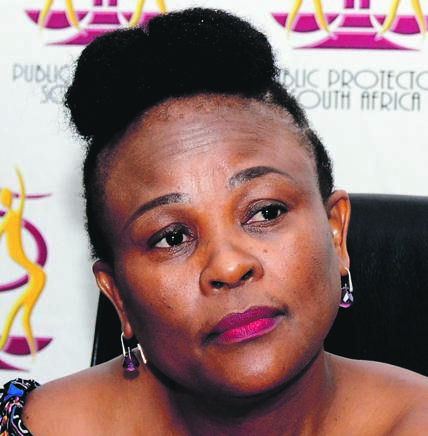
While the institutional foundation and framework of the office of the Public Protector cannot be faulted, it is the personal independence and impartiality of the incumbent that remains suspect, and this breach poses a grave threat to attempts to strengthen good governance, constitutional democracy and accountability.
The inclusion in our Constitution of institutions that support democracy, specifically the office of the Public Protector, is celebrated worldwide as the country’s most significant contribution to constitutionalism and constitutional democracy.
The office of the Public Protector is a bulwark of democracy.
The Public Protector does not perform his/her functions or exercise his/her powers in a vacuum.
Our constitutional and legal architecture requires that the Public Protector must not only respect the rule of law and the supremacy of the Constitution, but also act in good faith, be independent, impartial and, most importantly, be held accountable.
Recent scathing court decisions against the Public Protector are a serious indictment on the incumbent.
On one occasion (DA v Public Protector) the Pretoria High Court dismissed her report on review as “inept”, “absurd”, “grossly negligent” and “irrational”.
In another judgment (Absa Bank v Public Protector), the court stated that the Public Protector “does not fully understand her constitutional duty to be impartial and perform her functions without fear, favour or prejudice”.
Considered within the context of revelations at the Zondo commission of inquiry into state capture, these remarks are a cause for concern.
Effectively, these negative commentaries on Busisiwe Mkhwebane makes the following question inevitable: Is she a fit and proper person to hold the office of Public Protector?
The question relates to her conduct in the execution of her office’s powers and functions.
In the spirit of accountability, the National Assembly has a duty to investigate her conduct and – only if found unfit – commence proceedings to remove her from office.
Section 2(1)(c) of the Public Protector Act 23 of 1994, read together with section 194 of the Constitution, makes it obligatory for the president to remove a Public Protector from office on a finding by a portfolio committee on justice in the National Assembly of misconduct, incapacity or incompetence.
Such removal is subject to the adoption to that effect of a resolution by a two-thirds majority of the National Assembly.
A good starting point would be the aforementioned judgments.
In the spirit of substantive constitutional interpretation and dialogic constitutional adjudication required by the Constitution, courts play a central role in shaping political discourse around constitutional issues of national importance.
Examples of such issues are human rights, good governance and democracy.
However, in encouraging dialogue, courts have an obligation to act within the parameters of the law and the Constitution, which require them to avoid intrusion into the domain of the political arms of state, as well as to act independently, impartially and with no fear, favour or prejudice.
Similarly, the Constitution obliges the Public Protector to be independent of any undue external influences when executing his/her duties and functions.
Such influences may be in the form of pressure from the judiciary, legislature, executive, political parties or any other person.
In addition, the requirement of impartiality means the Public Protector must deal with facts and the law with an “open and enquiring mind”.
In other words, a Public Protector must be a research worker in relation to the facts and the law.
Subsequently, the law should be applied to the facts without any predilection or predisposition towards any person, whether out of fear of political reprisals or threats, or in anticipation of some inducements or favours.
Failure to comply with one or more of these requirements may be a breach of the act and thus probable grounds for incompetence and removal from office.
Removal of the Public Protector from office is the ultimate accountability mechanism, which explains why it is relatively difficult to remove the Public Protector from office.
While the issue of whether Mkhwebane is a competent person for office may have long-term implications for the institution, especially when improperly handled as it is not about the Public Protector’s office, per se.
If anything, it is about holding the occupant of the office accountable to the public, which is a constitutional imperative.
It is not about the number of Mkhwebane’s reports that have been invalidated under review, as this would amount to putting form over substance and therefore cannot pass constitutional muster.
Citizens, civil society and political parties should guard against allowing this important constitutional issue to degenerate into a party political matter, however difficult it may be, given the nature of party politics in South Africa.
We need to be guided by facts and the law.
Some of the considerations that arise from the Absa decision may be the meetings or interviews between the Public Protector and the State Security Agency and the former minister of state security; her meeting with the presidency and the failure to provide minutes of all the meetings and to disclose her meeting with Black First Land First officials; and her refusal to meet with Absa despite an obligation to do so in terms of the Promotion of Administrative Justice Act.
In short, the inquiry into her fitness to hold office should determine whether her conduct in dealing with the Absa issue and other matters was politically motivated.
If this matter is not given the adequate attention it deserves, we run the risk, as professor of law Charles Fombad cautions, of having a Public Protector who will undo the work of her predecessor and successfully turn the institution into a “political charade of symbolic value only”.
Mantjane is a teacher and scholar




 Publications
Publications
 Partners
Partners








